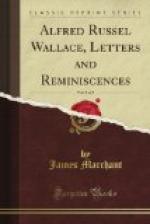During the last years of his life his pen was seldom dry. His interest in science and in politics was fresh and keen to the closing week. He wrote “Social Environment and Moral Progress” in 1912, at the age of 90. The book had a remarkable reception. Leading articles and illustrated reviews appeared in most of the daily newspapers. The book, into which he had put his deepest thoughts and feelings upon the condition of society, was hailed as a virile and notable production from a truly great man. After this was issued, he saw another, “The Revolt of Democracy,” through the press. But this did not exhaust his activities. He entered almost immediately into a contract to write a big volume upon the social order, and as a side issue to help, as is mentioned in the Introduction, in the production of an even larger book upon the writings and position of Darwin and Wallace and the theory of Natural Selection as an adequate explanation of organic evolution. Age did not seem to weaken his amazing fertility of creative thought, nor to render him less susceptible to the claims of humanity, which he faced with a noble courage. In nobility of character and in magnitude, variety and richness of mind he was amongst the foremost scientific men of the Victorian Age, and with his death that great period, which was marked by wide and illuminating generalisations and the grand style in science, came to an end.
Apart altogether, however, from his scientific position and attainments, which set him on high, he was a noble example of brave, resolute, and hopeful endeavour, maintained without faltering to the end of a long life. And this is not the least valuable part of his legacy to the race.
When Henslow died, Huxley wrote to Hooker: “He had intellect to comprehend his highest duty distinctly, and force of character to do it; which of us dare ask for a higher summary of his life than that? For such a man there can be no fear in facing the great unknown; his life has been one long experience of the substantial justice of the laws by which this world is governed, and he will calmly trust to them still as he lays his head down for his long sleep.” Let that also stand as the estimate of Wallace by his contemporaries, an estimate which we believe posterity will confirm. And to it we may add that death, which came to him in his sleep as a gentle deliverer, opened the door into the larger and fuller life into which he tried to penetrate and in which he firmly believed. If that faith be founded in truth, Darwin and Wallace, yonder as here, are united evermore.
* * * * *




